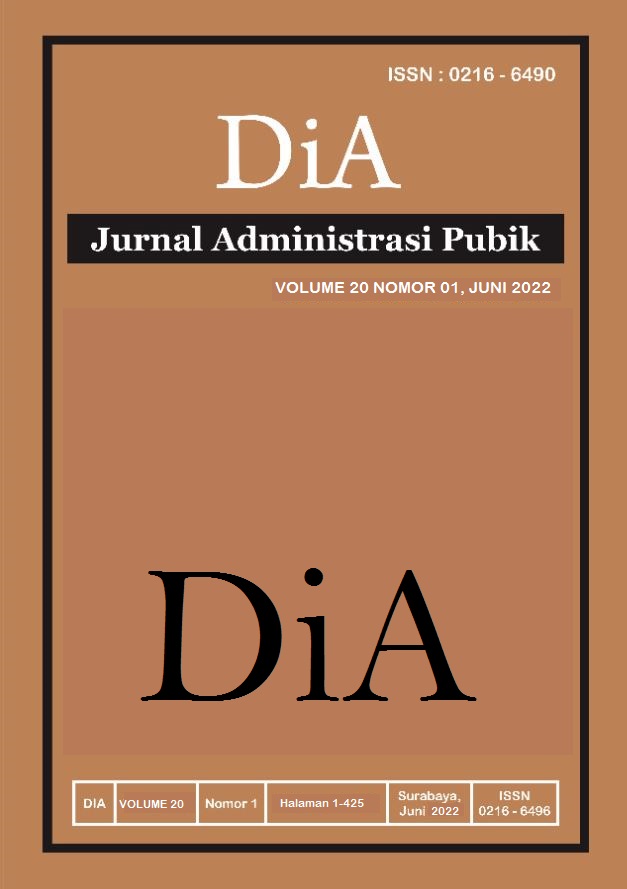COMMUNITY EMPOWERMENT IN ECONOMIC DEVELOPMENT IN SIDOARJO
DOI:
https://doi.org/10.30996/dia.v20i01.6465Keywords:
empowerment, community, development, economyAbstract
The purpose of this study is to describe the role of government and non-government in community economic empowerment as well as to alert the supporting and inhibiting factors that link the economic empowerment of the community in Kebonsari Village, Candi District, Sidoarjo Regency. There are many challenges faced by the government and the community who want or have ideas, for example, community empowerment to improve the economy for local residents and can become a pilot area for other regions in order to provide ideas for other opportunities to empower unemployed citizens to have their own stage. This research method uses a review paper using a research vosviewer, which reveals that the government policy of Sidoarjo Regency in community members, especially duck breeders in Kebonsari Village, Candi District, includes providing livestock assistance and facilitating facilities and infrastructure for duck breeders, as well as an extension of the Government. In fostering, directing and controlling including opening market opportunities, especially outside the regional market and also being able to improve the economy of Sidoarjo residents by empowering or providing ideas for business opportunities that can be utilized by the community and Sidoarjo residents themselves. With support from the government, the government provides facilities that can be used by the community. In addition, the facilities provided by the government are intended to get assistance from the banking sector, so that the community empowerment activities for duck farming groups are established. The limitation of this research is that journals and articles only use the Scopus data base. However, to overcome these limitations, the next research can also use other data bases.
Downloads
References
Akat, M., & Karata?, K. (2020). Psychological Effects of COVID-19 Pandemic on Society and Its Reflections on Education. Journal of Turkish Studies, 15(4), 1–13. https://doi.org/10.7827/turkishstudies.44336
Ali, Q., & Karyani, U. (2015). Identifikasi Jenis Layanan BK dalam Upaya Menjaga dan Meningkatkan Kesehatan Mental Siswa. Prosiding SEMNAS Penguatan Individu Di Era Revolusi Informasi, 363–376.
Anniko, M. K., Boersma, K., & Tillfors, M. (2019). Sources of stress and worry in the development of stress-related mental health problems: A longitudinal investigation from early- to mid-adolescence. Anxiety, Stress and Coping, 32(2), 155–167. https://doi.org/10.1080/10615806.2018.1549657
Badan Pusat Statistik. (2019). Potret Pendidikan Indonesia 2019 (D. Susila, I. E. Harahap, & R. Sinang (eds.)). Badan Pusat Statistik Indonesia.
Bernstein, G. A. (1991). Comorbidity and Severity of Anxiety and Depressive Disorders in a Clinic Sample. Journal of the American Academy of Child and Adolescent Psychiatry, 30(1), 43–50. https://doi.org/10.1097/00004583-199101000-00007
Budikayanti, A., Larasari, A., Malik, K., Syeban, Z., Indrawati, L. A., & Octaviana, F. (2019). Screening of Generalized Anxiety Disorder in Patients with Epilepsy: Using a Valid and Reliable Indonesian Version of Generalized Anxiety Disorder-7 (GAD-7). Neurology Research International, 2019. https://doi.org/10.1155/2019/5902610
Fitria, L., & Ifdil, I. (2020). Kecemasan Remaja Pada Masa Pandemi Covid -19. Jurnal EDUCATIO: Jurnal Pendidikan Indonesia, 6(1), 1. https://doi.org/10.29210/120202592
Johnson, R. B., & Larry, C. (2017). Educational Research: Quantitative, Qualitative, and Mixed Approaches (T. Accomazzo, J. Miller, R. Higgins, E. Helton, K. DeRosa, & C. West (eds.); 6th editio). Sage Publication Inc.
Juliawan, I. W., Wiguna, D. G. E. S., & Bawa, P. W. (2020). Persepsi Siswa Tentang Layanan Usaha Kesehatan Sekolah Jiwa Yang Diberikan Guru Bk Sma Negeri 1. Indonesian Journal of Educational Development, 1(2), 294–300.
Kementrian Kesehatan Repuiblik Indonesia. (2018). Laporan Nasional Rikesdas 2018. In Badan Penelitian dan Pengembangan Kesehatan (p. 198). http://labdata.litbang.kemkes.go.id/images/download/laporan/RKD/2018/Laporan_Nasional_RKD2018_FINAL.pdf
KPAI, T. (2020). “Survei Pelaksanaan Pembelajaran Jarak Jauh (PJJ) dan Sistem Penilaian Jarak Jauh Berbasis Pengaduan KPAI.” kpai.go.id
Krejcie, R. V, & Morgan, D. W. (1970). Determining Sample Size for Research Activities. Educational and Psychological Measurement, 38, 607–610. https://doi.org/https://doi.org/10.1177/001316447003000308
Kroenke, K., & Spitzer, R. L. (2002). The PHQ-9: A New Depression Diagnostic and Severity Measure. Psychiatric Annals, 32(9), 509–515. https://doi.org/10.3928/0048-5713-20020901-06
Larasati, L. A., Kristina, S. A., Pharmacy, C., Program, G., Pharmacy, F., & Mada, U. G. (2020). Prevalence of depression symptoms among diabetes mellitus patients : A survey from primary care setting in Indonesia. 25(05), 2273–2280.
Lusi, C. K., Hogowiyono, P., & Fuady, J. (2009). Pengebangan Sistem Pakar Untuk Mendiagnosis Gangguan Kesehatan Mental Peserta Didik di SMA Negeri 2 Malang.
Maulida, H., Jatimi, A., Heru, M. J. A., Munir, Z., & Rahman, H. F. (2020). Depresi pada Komunitas dalam Menghadapi Pandemi COVID-19: A Systematic Review. Jurnal Sains Dan Kesehatan, 2(4), 519–524.
Miranda, D. M. de, Athanasio, B. da S., Oliveira, A. C. S., & Simoes-e-Silva, A. C. (2020). How is COVID-19 pandemic impacting mental health of children and adolescents? International Journal of Disaster Risk Reduction, 51(August), 101845. https://doi.org/10.1016/j.ijdrr.2020.101845
Mubasyiroh, R., Suryaputri, I. Y., & Tjandrarini, D. H. (2017). Determinan Gejala Mental Emosional Pelajar SMP-SMA di Indonesia Tahun 2015. Buletin Penelitian Kesehatan, 45(2), 103–112. https://doi.org/10.22435/bpk.v45i2.5820.103-112
Downloads
Published
How to Cite
Issue
Section
License
The DiA journal allows authors to retain the copyright of their papers without limitation. Authors may grant publishers non-exclusive publishing rights to publish articles. Granting first publishing rights to publishers also qualifies as unlimited copyright (because there are no restrictions imposed by publishers on author copyright).







